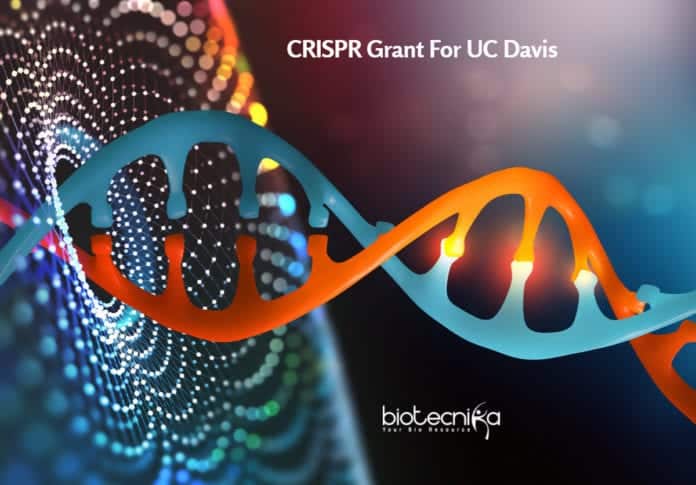CRISPR Grant For UC Davis
The National Institute of Health has awarded UC Davis researchers $1.5 million for the first part of a project to develop a novel approach to deliver genome-editing machinery to genes responsible for a rare form of familial cancer.
CRISPR is a technology that allows the alteration of DNA sequences to modify gene function. The researchers want to demonstrate that this technology can be successfully packaged and delivered to target cells in a living animal.
Kit S. Lam, distinguished professor, chair of the Department of Biochemistry and Molecular Medicine in the School of Medicine, and R. Holland Cheng, professor of Molecular and Cellular Biology in the College of Biological Sciences, have undertaken this project.
The award is one of the significant CRISPR grants at UC Davis as part of the NIH Somatic Cell Genome Editing Consortium (SCGE).
In May, UC Davis announced the launch of an NIH-funded research center dedicated to helping the nation develop safe and effective genome editing
. The $9 million grant to establish the UC Davis Nonhuman Primate Testing Center for Evaluation of Somatic Cell Genome Editing Tools will serve the Consortium by supporting studies that advance the future treatment of human diseases with gene editing.CRISPR Grant For UC Davis- The Project
The new grant by the NIH enables researchers at UC Davis to test a unique delivery system that utilizes an engineered, non-infectious hepatitis E virus to orally deliver CRISPR into cells in the gastrointestinal tract of mice. They will then measure the technique’s ability to edit targeted genes. Their primary goal is to edit APC, a gene that normally suppresses tumor growth. When the gene is defective, it can cause familial polyposis, which almost always leads to colon cancer.
Dr. Lam said that the major challenge is to deliver CRISPR into target cells in cancer or precancer then edit the gene. It is relatively challenging to deliver CRISPR to diseased tissues or organs in a living animal. This is the major challenge being faced by the researchers
The researchers’ multi-disciplinary approach to the effort involves varied specific areas of expertise.
Lam’s combinatorial chemistry and nano delivery work will be employed to deliver the CRISPR genes to the targeted cells in the gut. The Cheng lab will create a non-toxic, non-infectious hepatitis E virus in the laboratory that can be used to encapsulate CRISPR for oral delivery to the mouse.
Dr. Cheng said that with the help of the protein engineering method, a state-of-the-art cryo-electron microscope, the scientists had optimized the hepatitis E viral capsule as a nano delivery carrier. The viral vector is capable of passing through the harsh environment of the stomach and deliver the loaded gene editors to targeted cells in the gut.
David Segal, a professor in the Department of Biochemistry and Molecular Medicine and an SCGE Davis Center leader, will design the CRISPR gene-editing system. He added that the unique property of the virus would allow the team of scientists to test the delivery of both protein and nucleic acid forms of the editor. Researchers will use state-of-the-art techniques for design and analysis.
This study using -CRISPR Grant For UC Davis- could lead to new treatments for diseases of the gut, including colorectal cancer.






























